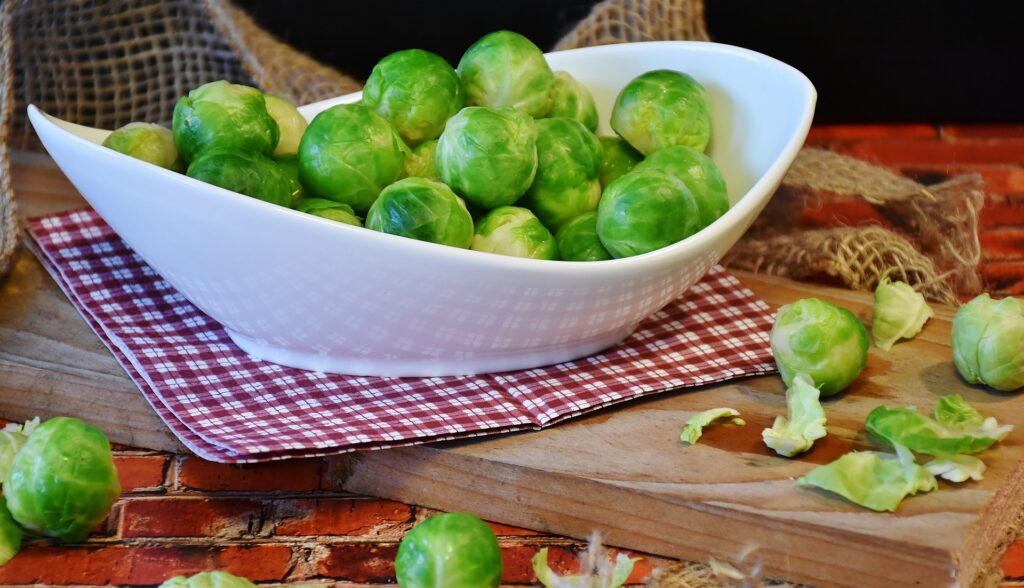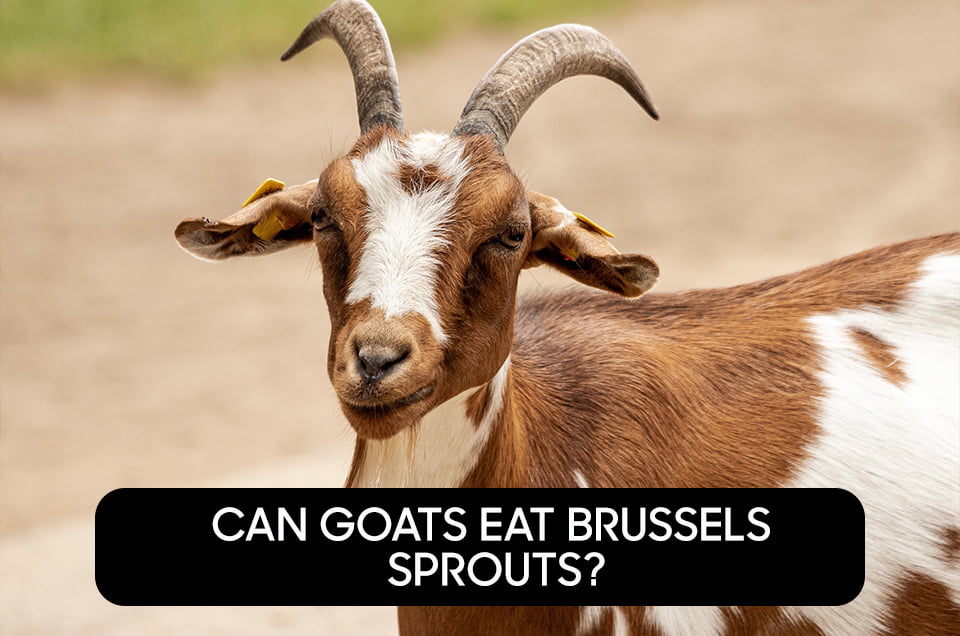
Goats can eat brussel sprouts in moderation, but it is not recommended that they consume the entire plant. The leaves of the brussel sprouts contain glucosinolates that can be toxic to goats.
Brussels sprouts are a high nutrient vegetable that is rich in vitamins and minerals. They are also a good source of fiber, potassium and antioxidants.
They are a good source of nutrients
Brussel sprouts are a good source of many nutrients, including vitamin C and vitamin A. These vitamins help to protect the skin from sun damage, increase eye health and boost immunity. They also promote new cell growth. They contain high levels of antioxidants, which help to slow aging and protect against cancer.
brussel sprouts are also an excellent source of calcium, magnesium, zinc, iron, and potassium. These minerals are important for goats because they help to promote muscle development, bone growth, and reproductive function. They also support the nervous system, regulate body temperature and maintain the healthy functioning of the gastrointestinal tract.
In addition to being a great source of nutrients, brussel sprouts are a good source of fiber. Adding a large amount of fiber to your diet can help to improve digestion, reduce the risk of colon cancer and lower blood pressure.
If you want to give your goats extra nutrition, consider supplementing their diet with a high-quality rumen feed such as chaffhaye or a pelleted goat feed that has been formulated by a livestock nutritionist. These products offer more nutrients than ordinary hay and are easier to digest for your goats.
A goat’s dietary requirements are primarily met by appropriate forages, combined with mineral supplements (either fortified hay or a supplemental pellet). The type of forages that you offer your residents should depend on where they live and what they can find in your area.
Goats are primarily herbivores, so their diet should be based on grass and other plants that they can browse for. They also need to have access to a variety of roughage and fiber sources, as they spend hours ruminating each day.
The most common types of hay for goats are alfalfa, clover, and lucerne. They can also eat oats and barley but these grains should be fed in moderation as they can cause acidosis, grain overload/poisoning, and even death when over consumed.
Some goat owners use a special form of alfalfa called chaffhaye, which is made by cutting early alfalfa and mixing it with molasses and a probiotic culture called Bacillus subtilis. These chaffhayes are vacuum-packed and offer more nutrition than regular hay.
They are a good source of fiber
Brussels sprouts are a low-cost, high-fiber vegetable that is easy to grow and is available in a variety of colors. They are rich in vitamins C and K and have a very low fat content. They can be harvested early in the season, which means that they are a great option for farmers who want to provide their goats with a nutritious, fresh source of food.
While brussel sprouts can be a delicious addition to any diet, you should not overfeed them or eat too many of them. This can cause indigestion and dehydration in your goats, so only feed them a few brussel sprouts a day.
Goats need a high-fiber, low-starch diet to support their growth and reproduction. They require at least 12% crude fiber in their rations, which can be obtained from foraging grasses, shrubs and weeds that are available during the growing season.
They can also obtain dietary fiber from a variety of other sources including whole grains, vegetables and fruits. The cellulose in plant fibers is broken down by the bacteria in the goat’s rumen into fatty acids that provide energy for the animal.
Besides a high-fiber diet, goats need plenty of protein. They can get this from lush leafy forage and browse, as well as from the proteins found in grain and forage grains.
Legume hay is a good choice for your goats because it is loaded with essential vitamins, minerals and other nutrients. Alfalfa, clover, and birdsfoot trefoil are some of the most common types of legume hay.
Other types of hay that you can use for your goats include timothy and corn hay. They are both soft and sweet and contain a lot of fiber but not as much protein as alfalfa or clover hay.
You can also give your goats a treat from the garden and kitchen scraps that are available. Banana peels, orange peels, tomato skins, garlic skins and other fruit and vegetable cutting are all suitable for your goats.
The seeds and rind of pears are also an excellent treat for your goats. They contain potassium and vitamin C, which are both important for your goat’s health.
They are a good source of antioxidants
Brussels sprouts are a nutrient-rich vegetable that can be a great addition to your goat’s diet. They are an excellent source of antioxidants and fiber, and they also contain vitamins C and K, folic acid, and manganese.
You can feed goats brussel sprouts in small pieces, but you should not boil them because this can destroy many of their nutrients. It can also make them mushy and bitter, which is why you should always give your goats fresh sprouts.
Brussel sprouts are a good source of vitamin E and selenium, which are important for animal health. Goats need these nutrients to stay healthy and strong. They should be fed a balanced diet that includes these ingredients and more.
These two nutrients can help improve the quality of milk and meat, and they can also prevent oxidative stress. This is because they can affect the activity of the antioxidant enzymes that protect the body from damage. Moreover, they can increase the amount of beneficial fats in the milk.
In addition, they can improve the tenderness of the meat. Studies have shown that dietary supplementation with selenium (Se) can increase the tenderness of the meat and improve the fatty acid composition. Similarly, the lignans present in the plant flax and sesame have an impact on the oxidative status of the blood plasma and the oxidative stress indicators in the milk.
Lignans can also protect the rumen microorganisms, which are important for the proper function of the rumen. They can also regulate the hydrogenation of PUFAs, which increases the concentration of beneficial FAs and improves the protein and amino acid composition of the meat.
Another way to get more antioxidants in your goat’s diet is to add fruits and vegetables. These are low in calories and are a good source of vitamin A, B complex vitamins, calcium, copper, iron, and potassium. They can also boost your goat’s energy levels and promote healthy skin and coat. They also help keep your goat’s immune system strong, which can prevent illnesses and diseases.
They are a good source of vitamin K
Brussel sprouts are a good source of vitamin K, which is essential for bone health and blood clotting. This nutrient also promotes gut health, improves cholesterol levels, and reduces the risk of diabetes. Moreover, it is necessary for healthy skin and eyes.
A cup of brussel sprouts provides about 159 micrograms of vitamin K, which is more than the daily recommended intake for men and women. However, people who are taking warfarin or other blood-thinning medications should monitor their vitamin K intake.
This nutrient also plays a role in bone metabolism, promoting the formation and mineralization of bone tissue. It also helps prevent and regulate bone resorption, which occurs naturally as we age.
It also promotes heart health by reducing inflammation and helping blood vessels stay healthy. It also boosts immune function and supports iron absorption.
One of the best ways to eat brussel sprouts is to add them to soups, salads, and other dishes. Alternatively, you can roast them to bring out their flavor and texture.
These vegetables are a great source of fiber, which supports digestive health and promotes regular defecation. They also contain glucosinolates, which are anti-inflammatory compounds. These substances can also help suppress the growth of cancer cells.
Brussels sprouts are low in calories, making them an ideal choice for those following a diet aimed at losing weight. They are also rich in vitamin C, a powerful antioxidant that can help preserve eye health and reduce the risk of cataracts.
In addition, brussel sprouts contain vitamins B6, thiamine, and folate, as well as the mineral potassium. They are also a good source of calcium, which is crucial for healthy bones and teeth.
Aside from being a good source of vitamins and minerals, brussel sprouts are also a good source of fiber. They contain more than 50% of the recommended daily intake of dietary fiber, which can support digestion and help keep blood sugar levels steady.
They are also a good source of the antioxidant alpha-lipoic acid, which has been shown to lower glucose and insulin levels in people with type 2 diabetes. It also has been shown to prevent oxidative stress, which can lead to cellular damage and increase the risk of chronic disease.





